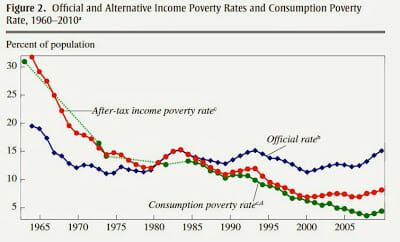Who's Subsidizing Whom? And Should We Oppose All New Anti-Poverty Programs as Crony Giveaways?
Well, the new meme on the Left in favor of higher minimum wages seems to be that since many minimum wage workers also receive government benefits, those benefits "subsidize" the employers paying minimum wage. Example from Kevin Drum here. This is utter madness. A few responses:
- The implication is that the choice is between a job at $8 an hour or a job at $15 an hour. But this assumes the jobs still all exist at $15 an hour. Clearly, many would disappear over time, either as companies automate or as consumers reduce purchases at now higher cost establishments. If the alternative to offering a $8 an hour job is in fact offering no job at all, then minimum wage employers are reducing government benefits payouts.
- The Left has pushed eligibility for many programs (e.g. the changes in Obamacare to Medicaid) into higher income bands of people making more than 100% of the poverty line. How is this creeping up of transfer program eligibility somehow the fault of employers?
- Does this mean that all right-thinking Americans should oppose any future expansions of transfer programs as crony giveaways? And if you say no, that they should not be thought of crony giveaways in advance of their passage, why should they be considered such afterwards?
- The whole point of many of these programs, like the EITC which is listed among the programs in Drum's post, is exactly this -- to provide transition assistance from not working to supporting oneself. The Left's view on this is, as usual, entirely static. What are the folks who are on benefits and working in food service doing 5-10 years from now? Would they look back on that time as a stepping stone to something better?
- If you require that all employers pay a salary such that none of its workers are on assistance of any sort, which is the logical conclusion of this meme, then you divide the world into two classes -- those 100% employed and those 100% on benefits, with most people in the latter having little or no prospect of moving to the former.
- My company pays minimum wage to the vast majority of our 300+ campground workers. But who is subsidizing whom? Most of these folks are over 60 and on Social Security and find that they need or want more money than their Social Security can provide. One reason for this is that Social Security is a horrible retirement savings program, essentially paying a negative interest rate on the money contributed to the system in the retiree's name. If Social Security were a private retirement plan, its proprietors would be in jail by now. Because Social Security is so lame, older people seek work, and come to me, happy to stay active and earn money to supplement their government checks. So am I subsidizing the SSA's inability to provide a fair return?
